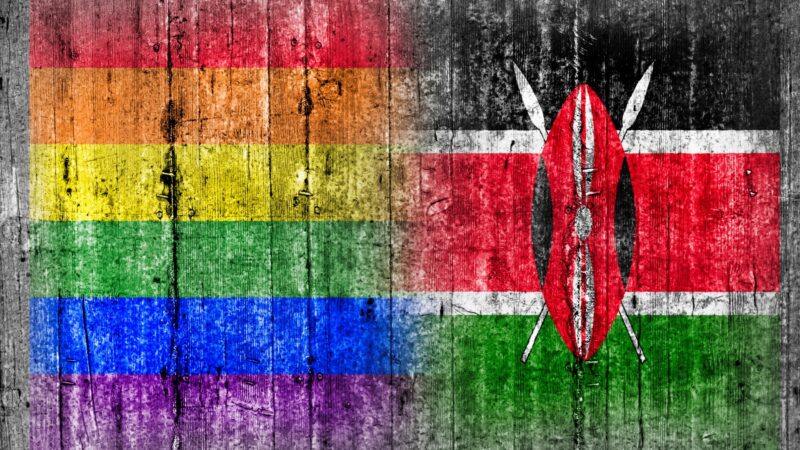Kenya sees economic losses because of its anti-LGBTQ+ stance

Illustration courtesy Sydney Allen
By Linda Ngari
Kenya is losing money for over-policing people who identify as lesbian, gay, bisexual, transgender, queer, or non-heteronormative (LGBTQ+). The overriding rule that criminalises the LGBTQ+ community in the country falls under the pre-colonial penal code laws which do so on the ambiguous premise of “unnatural offences.” Such a stance impedes global investments by liberal entrepreneurs who find the country hostile.
When President William Ruto was elected in 2022, he, like his predecessor Uhuru Kenyatta, dismissed the need to ensure equal rights for members of the LGBTQ+ community. In an interview in September 2022, Ruto said that only when matters concerning LGBTQ+ people become a major issue in the country, will Kenyans make a decision. This was similar to former President Uhuru Kenyatta’s stance in 2018, when he said that protecting the rights of LGBTQ+ people was not a priority for Kenyans.
When leaders make the perpetual assault of LGBTQ+ people a non-issue, victims attacked because of their gender or sexual orientation in turn face the same treatment from the community and, worse, from the police. According to the Gay and Lesbian Coalition of Kenya (GALCK), 53 percent of people in the LGBTQ+ community in Kenya have been physically assaulted.
Consequently, the Kenyan economy is largely driven by those who strictly subscribe to heteronormative concepts, locking out other potential investors. The penal code rule and its reinforcement by political leaders who claim to uphold Christian values have exposed LGBTQ+ people to health issues and depression at higher rates than the general population.
According to GALCK, only 29 percent of LGBTQ+ people report their assaults to the police because they are often revictimized. Seeing as their rights are shrugged off right from those in power, police frequently disregard and trivialise reports of assault when victims identify or present as queer. As Kenya looks to mark 60 years of independence this year, therefore, it is time to abandon colonial-era laws known to uphold slavery and racism, among other extreme human rights violations. An example of post-colonial legislation is the Universal Declaration of Human Rights (UNDHR) which was agreed upon in the aftermath of World War II. The UNDHR, to which Kenya is a signatory, describes the rights and freedoms of all as inalienable, meaning they cannot be taken away or given away by the possessor.
Two recent cases are the murders of Edwin Chiloba in January this year and Sheila Lumumba in April 2022. Chiloba, a 25-year-old gay rights activist, was found dead on January 3; he was reportedly strangled and stuffed into a metal box. Lumumba, also 25, was a non-binary lesbian who was raped and murdered in Kenya’s Nyeri County. After Chiloba’s murder, hashtags like #NotOurCulture trended on Twitter, claiming same-sex relationships are “unAfrican.” The same Kenyans forget that many people deemed Christianity as “unAfrican,” yet it is widely practised in the country today. Sadly, the hashtag focused on Chiloba’s queer identity while overlooking the blatant injustice of his cold-blooded murder.
More liberal economies, which recognise, guarantee and protect the freedoms of all, attract a wider pool of investment. Hence a crucial component of every company's Diversity, Equality, and Inclusivity (DEI) policy should be to include the LGBTQ+ population. DEI policies imply that businesses proactively take steps to include marginalized groups in their employment strategies while working towards ensuring equality and equity among all. According to Open For Business, LGBTQ+-inclusive employers have earned 9.1 percent more than the market average since 2010. These employers attract loyalty from both LGBTQ+ customers and employees. A report from top-tier global auditing firm Deloitte, further notes that more than 70 percent of LGBTQ+ employees are inclined to stay with their current employer.
Failure to openly protect the fundamental rights of the LGBTQ+ minority could be costing Kenya up to 1.7 percent of its GDP. In the survey by Open For Business, a group of international businesses committed to research and actions on LGBTQ+ inclusiveness, 1.7 percent of the GDP amounts to annual income losses of up to USD 1.3 billion, which is equivalent to KSH 130 billion. The USD 1.3 billion is divided into three parts: about USD 140 million (KSH 14.3 billion) lost in the tourism industry because some visitors find the country hostile; USD 105 million (KSH 10.7 billion) lost in productive labor through unemployment and underemployment, and USD 1 billion (KSH 105 billion) lost in poor health outcomes as a result of stigma, assault, depression, and other physical and mental illnesses.
It’s worth noting, however, that Kenya has made some strides towards inclusivity for people in the LGBTQ+ community, and Nairobi moved up in the Open For Business City ratings in 2022. This is attributed to the gains driven by a strong LGBTQ+ movement that is constantly working to shift norms, repeal the unconstitutional penal codes and focus on building strong innovation and start-up hubs in the city. Kenya had also made remarkable strides in the 2019 census, by becoming the first nation in the world to include intersex people as a distinct group. Yet another notable move is the recent Supreme Court of Kenya ruling which granted the LGBTQ+ community the right of association under the Non-Governmental Organizations Co-ordination Board.
While greater inclusion for the LGBTQ+ community could see Kenya gain USD 140 million (KSH 14.3 billion) per year, according to Open For Business, ultimately, inclusivity would largely encourage young people to be themselves without fear.
Linda Ngari is a writing fellow at the African Liberty.
No comments:
Post a Comment